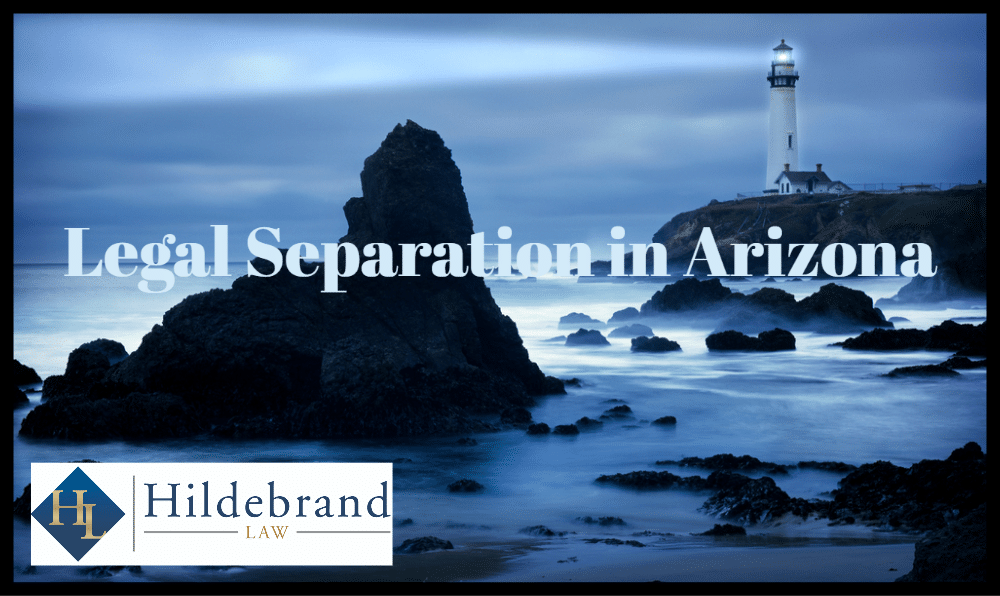Differences Between Divorce and Legal Separation in Arizona

Table of Contents
Divorce or Legal Separation: Know the Difference in Arizona
Many people want to know the difference between divorce and legal separation in Arizona to decide if they should file for divorce or legal separation. We want to share information regarding the differences between those two options as well as to discuss some of the benefits of a legal separation over a divorce in Arizona. There are many reasons you might choose legal separation over a divorce.
The Change in Marital Status
The main difference between the two types of family law cases in Arizona is that a divorce completely dissolves the legal status of the marriage and returns each spouse to the status of a single person.
A legal separation does not dissolve the legal status of the parties’ marriage and does not, therefore, return each party to the status of a single person. An individual who is legally separated, therefore, can’t get married.
Division of Debts and Assets in a Divorce or Legal Separation
In either case, you will either have to file for divorce or file for legal separation. The court is then required in both an Arizona divorce case, as well as an Arizona Legal separation case, to divide the parties’ debts and assets, enter orders regarding the care, custody, and control of the parties’ children, enter a spousal maintenance award, if appropriate, and order the payment of child support.
All assets and debts incurred by either party after the service of the Petition for Dissolution of Legal Separation or Petition for Dissolution of Marriage will be the sole and separate property or debt of the party acquiring that property or debt.
The same happens after a divorce, or legal separation becomes final. Arizona child custody law and Arizona community property laws are applied the same way in either a legal separation or a divorce in Arizona.
Differentiating Legal Separation and Divorce
It is not uncommon for couples to find themselves facing difficulties in their marriage that lead to one or both parties believing it would be more beneficial for the partnership to end.
While divorce is most likely the first thing that comes to mind, couples have another option they can utilize to make the process easier. Legal separation is a commonly used solution for couples seeking a resolution to their marital qualms without completely dissolving the marriage.
If you are considering putting an end to your marriage, you may want to weigh the options of both legal separation and divorce, figuring out which one best fits your needs. Family law matters like divorce are complicated and pose many potential problems, which is why having an expert to guide you through the process is highly beneficial.

A legal separation is different from a divorce in that it does not fully dissolve the relationship of the two parties involved. Instead, obtaining a separation means that, while the legal status of the marriage is left in place, the involved parties are no longer part of a joint marital community.
This means that any debts, purchases, earnings, or other similar acquisitions belong solely to the person to whom they belong, but the status of the marriage is not terminated.
Separation is often considered the minor version of a legal end to a relationship, where divorce is the end of the line, both literally and metaphorically. Legal separation comes in varying shapes and sizes, ranging from trial separation to full legal separation. A trial separation is suitable for couples who are unsure of their circumstances and want to experiment with the idea of a legal separation or divorce without making such a move official too hastily.
There are several reasons why a couple may elect to go the route of separation rather than divorce, which we will discuss in another entry. However, it is not unheard of for spouses to make the best of an unfortunate situation by capitalizing on bypassing the divorce option. Divorce, on the other hand, is the complete termination of the marriage. In no capacity are spouses still connected regarding belongings, debts, and other financial obligations that are incurred following the end of the marriage.
However, a divorce can mean other issues will arise such as alimony and spousal support and other past financial matters. The reasons spouses will opt for divorce over a legal separation can vary, but often boil down to irreconcilable differences. Rather than being legally obligated to each other in a minimal capacity, a divorce gives the parties the ability to completely be free of obligations, except for things like court-ordered alimony or child custody questions if the spouses have children together.
The similarity of a Legal Separation and a Divorce in Arizona

While the differences between divorce and separation are staggering, both avenues will share common ground in their aftermath. Like any family law situation, shared property and lives bring with them plenty of outcomes. For example, child custody issues are obviously going to be prevalent when it comes to a legal separation as they would in a divorce. A legal separation means the parents are not living in the same home, so the care of the children must be delegated accordingly.
Alimony and spousal support are also prevalent in both separation and divorce, as the separation can mean one spouse is unable to support their way of life immediately following the filing and fulfillment.
Many issues will present themselves in both divorce proceedings and legal separation, so if you have any questions, it is best to seek out a legal professional with family law expertise to guide you through.
The processes involving legal separation and divorce are complicated and have the potential to be utterly confusing. Not only do they have a lot of similarities, but the differences are staggering and important.
Divorce is the complete termination of marriage, leaving no connection between the spouses, save for things like children and jointly incurred debts. Legal separation, on the other hand, is a way for spouses to keep certain facets of their relationship intact while not being legally bound.
Both of these options have aspects they cannot avoid, most obviously including child custody and child support, as well as the question of alimony or spousal maintenance payments. While unfortunate, sometimes the best answer for both spouses involved in such a case is to end the marriage and find a way to move on in their lives.
Benefits of Legal Separation Instead of a Divorce in Arizona
Some of the benefits of choosing legal separation over a divorce in Arizona if you want to be eligible to claim higher social security benefits under your spouse’s social security benefits but have been married less than the ten years required to do so. You also might choose a legal separation to stay on your spouse’s employer-sponsored group health insurance plan.
You need first to verify that the group plan permits you to remain on the plan if you are legally separated. Another difference and benefit of legal separation versus divorce in Arizona are that you may have firmly held religious beliefs against divorce, in which case you may choose legal separation over a divorce.
The Process of Divorce and Legal Separation

Now that we have addressed the difference between a divorce and a legal separation, as well as the benefits of a legal separation over a divorce, you need to understand the process of legal separation in Arizona.
Unfortunately, a legal separation is no different than a divorce. Both actions required that you file an initial complaint, disclose certain information and documentation, and either settle your case or present your case to a judge in a final trial for the court to issue its Decree of Legal Separation the same way the court would proceed with an actual divorce. So, a legal separation will take just as long and be just as costly as a divorce.
However, there are some things you can do to save time and money going through either a legal separation or a divorce. The first thing you can do to save time and money on a legal separation or divorce is being organized.
Make a spreadsheet of all of your assets and debts and bring that spreadsheet to your lawyer. Compile copies of all of our account statements for all of your assets and debts, as well as retirement accounts and present them to your attorney in an organized manner. Speak to a qualified Arizona legal separation attorney or divorce lawyer to determine what will likely happen to your children, your assets and your debts and try to resolve your case without having to go to trial.
If you have questions about the difference between divorce and legal separation in Arizona, you should seriously consider contacting the attorneys at Hildebrand Law, PC. Our Arizona legal separation and family law attorneys have decades of combined experience successfully representing clients in legal separation and family law cases.
Our family law firm has earned numerous awards such as US News and World Reports Best Arizona Family Law Firm, US News and World Report Best Divorce Attorneys, “Best of the Valley” by Arizona Foothills readers, and “Best Arizona Divorce Law Firms” by North Scottsdale Magazine.
Call us today at (480)305-8300 or reach out to us through our appointment scheduling form to schedule your personalized consultation and turn your legal separation or family law case around today.
Contact Form

More Articles About Legal Separation in Arizona
- LEGAL SEPARATION LAWS IN ARIZONA
- BENEFITS OF LEGAL SEPARATION IN ARIZONA
- LEGAL SEPARATION AND TAXES IN ARIZONA
- HOW TO STOP A LEGAL SEPARATION CASE IN ARIZONA
- HOW LONG DOES A LEGAL SEPARATION TAKE
- HOW LONG CAN YOU BE LEGALLY SEPARATED IN ARIZONA
- HOW TO CONVERT A LEGAL SEPARATION INTO A DIVORCE DURING THE CASE
- REVERSING A LEGAL SEPARATION IN ARIZONA
- DISADVANTAGES OF A LEGAL SEPARATION IN ARIZONA
- ARIZONA LEGAL SEPARATION FREQUENTLY ASKED QUESTIONS

About the Author: Christopher Hildebrand is an award-winning Arizona divorce and family law attorney with decades of experience with a law practice that has received numerous awards including “US News and World Report Best Law Firms”, “Top Family Law Attorney” from North Valley magazine, “Best of the Valley Family Law Attorneys” from Arizona Foothills Magazine, “Preeminent Attorney AV Rated” attorney from Martindale-Hubbell, and many others.
